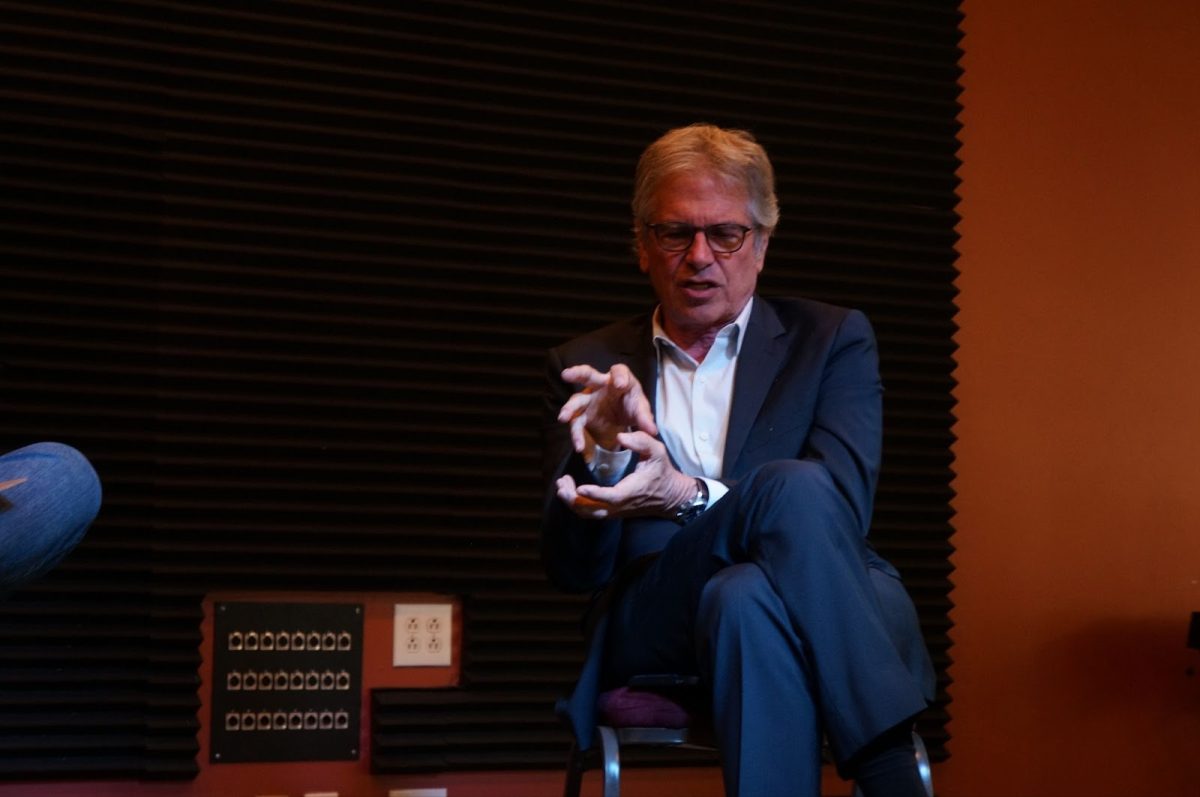On Oct. 12, Guilford College’s Bryan Series welcomed Walter Parkes, award-winning screenwriter and producer of over 50 films including “War Games” and “Men in Black,” at the Steven Tanger Center in downtown Greensboro. Parkes’ talk covered topics from his career in movies, to his insight in the complexities of storytelling, to his current project that combines virtual reality with education.
To begin the night, the evening’s theme—arts and education—was underscored by celebrating local heroes who exemplified the theme, including Jhonatan Marin Mesa, Guilford County Schools’ teacher of the year. Guilford president Kyle Farmbry then took the stage to introduce Parkes and spoke briefly about the Innovation and Entrepreneurship Forum earlier that day, which focused on ethics and artificial intelligence in education.
The looming question of AI and its growing influence on our daily lives is just one of the existential questions that Parkes says can be best organized and processed with the help of storytelling.
“We’re living in a time right now that’s really governed by either scientific or social processes that we just aren’t quite equipped to understand.” Parkes said.
“Whether it’s the COVID virus that literally crippled us for three years or what’s on everyone’s mind—AI? Does anyone really understand that?” he said. “Almost like before the Enlightenment, we tend to look for ways that we can understand and organize these ideas, and the one that we’re most hardwired with is narrative.”
At the core of his presentation, Parkes describes the three essential elements of narrative that make them truly engaging, and thus powerful: characters and their motivation, the rule of three, and binary endings.
All three of these elements make narratives engaging because they reflect some element of real life.
“Definitive motivations for characters drive into the story, and what’s great about this is we are all main characters of our own lives,” Parkes said. “This is how we connect, this is how we empathize with a character in a movie.”
Parkes then went into “the rule of three,” which states that an element of a story should repeat three times for maximum effect, creating a pattern that people can point out while not becoming too repetitive.
“This idea of a three-act structure is not something we invented as writers, but rather it is a description of how we exist in the world because we live in a three-act play,” Parkes said. “We all remember the past, we’re all aware of the present and we anticipate the future.”
Finally, he said, all stories come to a binary ending, meaning either something happens or it doesn’t. For instance, the hero gets the girl, or he doesn’t.
Parkes referred to early Greek mythology as an example of the binary being ingrained into the human narrative. “… early humans lived in a world based in their binary opposites; things were either touched by humans or they were not,” he said.
In the past, the binary ending served as a simple tool to clarify concepts that people couldn’t grasp, Parkes said. While endings have evolved to reflect intricacy in today’s increasingly complex world, for a story to succeed, it is still crucial for endings to retain an element of clarity, he said.
“Complexity can’t be complicated. Complexity requires simplicity,” he said. “If at the end of your story or your presentation, you’re decoding and explaining everything, it’s never going to land.”
According to Parkes, once all of these elements are combined, storytelling can organize information in a way that is emotive and engaging for the audience’s active understanding. This quality of storytelling is exactly what led Parkes to partner with Arizona State University president Michael Crow in implementing Dreamscape Immersive at the university.
Dreamscape Immersive is a virtual reality company co-founded by Parkes that produces various games, such as Alien Zoo, which are meant to harness the three elements of story and draw on humans’ inclination to explore hands-on.
“Students are learning as they become the hero of their own academic journey,” Parkes said. “That three-act structure, as it turned out, became an incredibly valid way to look at scientific exploration. Act one: discovery, act two: exploration, and then resolution and then extension because act three can’t be simplistic. I mean, science is based sometimes on getting things wrong.”
While VR and AI have proven to be helpful in education because of their storytelling powers, Parkes ended his talk by warning that “just because a story moves us doesn’t mean it’s the truth.”
The 2023-24 Bryan Series continues Nov. 9, when Lynsey Addario, a Pulitzer-winning photographer who has been covering humanitarian issues in the Middle East and Africa for more than 20 years, will speak at the Tanger Center.













